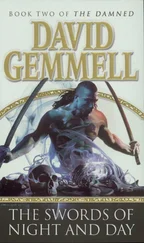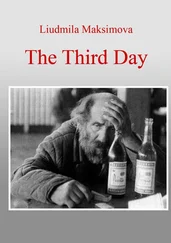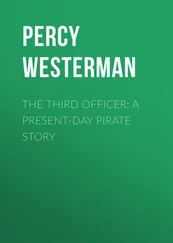David Epperson - The Third Day
Здесь есть возможность читать онлайн «David Epperson - The Third Day» весь текст электронной книги совершенно бесплатно (целиком полную версию без сокращений). В некоторых случаях можно слушать аудио, скачать через торрент в формате fb2 и присутствует краткое содержание. Жанр: Фантастика и фэнтези, на английском языке. Описание произведения, (предисловие) а так же отзывы посетителей доступны на портале библиотеки ЛибКат.
- Название:The Third Day
- Автор:
- Жанр:
- Год:неизвестен
- ISBN:нет данных
- Рейтинг книги:3 / 5. Голосов: 1
-
Избранное:Добавить в избранное
- Отзывы:
-
Ваша оценка:
- 60
- 1
- 2
- 3
- 4
- 5
The Third Day: краткое содержание, описание и аннотация
Предлагаем к чтению аннотацию, описание, краткое содержание или предисловие (зависит от того, что написал сам автор книги «The Third Day»). Если вы не нашли необходимую информацию о книге — напишите в комментариях, мы постараемся отыскать её.
The Third Day — читать онлайн бесплатно полную книгу (весь текст) целиком
Ниже представлен текст книги, разбитый по страницам. Система сохранения места последней прочитанной страницы, позволяет с удобством читать онлайн бесплатно книгу «The Third Day», без необходимости каждый раз заново искать на чём Вы остановились. Поставьте закладку, и сможете в любой момент перейти на страницу, на которой закончили чтение.
Интервал:
Закладка:
She didn’t say anything else for a moment. Leprosy was not an ailment that twenty-first century Americans thought much about. Like togas and spears, the disease belonged to a long-vanished age.
If only.
“A boyfriend in college once told me that the armadillo could be a carrier and that I should avoid handling them for that reason. I didn’t believe him, though. He was always telling these ridiculous stories.”
“He was right about that one,” I replied, “although from what I’ve read, modern research has found that it’s not quite as contagious as people once thought.”
“Is it curable?”
“Antibiotics are effective if you catch it early enough.”
She went quiet for a moment.
“What if we’re …?”
“Stuck here past Sunday?” I replied.
“Yeah. Could we get it? I mean, an advanced case, like that one?”
“I don’t think it spreads that fast.”
Still, it was to our advantage to avoid the disease, if we could.
A pause.
“I, uh … you know, kicking that man …”
“Don’t worry about it,” I said.
“The laughing … the cruelty … that was wrong .”
“Yes,” I replied.
She didn’t respond.
“Look, it’s OK,” I said.
I knew it wasn’t, but at the moment, we’d gain nothing by dwelling on the subject.
Lavon told me earlier that Sharon had spent the last five Thanksgiving holidays dishing out meals at a homeless shelter. Now, this kind spirit had to confront, first-hand, why people of the ancient world held the disease in such abject terror, and admit that they had a legitimate reason for responding the way they did.
She would just have to work through it in her own mind.
“Do you have any idea where you are?” I asked, as much to take her thoughts off that particular struggle as to obtain a geographical coordinate.
She hesitated for a moment while she poked her head through the curtain once more. “We’re outside the city,” she said. “I think we passed through the Damascus Gate a minute ago. Now we’re heading south, toward the palace.”
“OK.”
“Azariah is eyeing at me kind of strangely, too. He has to be wondering why I keep talking to myself. I think he’s worried I’ll bolt.”
“Hang in there. I’ll call you again when I find the others.”
Chapter 31
I removed the earpiece and slipped it under my tunic; then I climbed up toward the city until I got within about a hundred feet of the main road.
Once there, I sat down on a rock next to one of the ubiquitous olive trees and watched. I figured if anyone questioned what I was doing, I’d do my best to pretend that I was a slave waiting for his master, as ordered, by the gate.
I needn’t have worried. In an era without reliable timekeeping, slaves occasionally had to wait for days. Lavon explained later that this was common practice.
By the look of it, the Romans had outsourced security in this section of town to the local constabulary. Black helmeted sentries, in uniforms resembling those I had seen on the Temple police, paced the walls, while a half dozen or so of their colleagues manned their stations at ground level.
Occasionally, they pulled travelers aside and inspected their cargo, but otherwise they made little effort to stop the flow of people and animals into the city. Given the nature of the crowd, I’m not sure they could have, even if they had wanted to.
About one in every five itinerants either rode a donkey or led one laden with provisions, and I was reminded of what the world must have smelled like before the widespread adoption of the internal combustion engine.
Not every donkey was as eager as its owner to go inside, either. I watched one heavily burdened animal sit down on a flat stretch of road and simply refuse to take another step. Its owner cursed and swore, flogging the poor creature with a thin piece of cane.
It never so much as budged.
The passers-by just laughed. One of them must have made a snide comment, for suddenly the owner launched into an even greater frenzy, until the unfortunate beast rolled over as best it could under its load. Whether it had died or was just resting, I never got close enough to tell.
***
I had waited for about half an hour, soaking in the scene, when I finally spotted Lavon.
That wasn’t as hard as I had initially feared. As it turned out, the average man in first century Judea measured less than five foot six, so each of my fellow travelers stood head and shoulders above the rest.
All three appeared to be going strong. Their eyes, though, were so focused on the city walls and the crowd at the gate that none of them saw me slip into the file of travelers behind them.
“Does anyone have spare change for a poor mendicant beggar?” I said.
They all turned, but it took a moment for the English words to register, and a moment longer for them to realize the person behind them was me.
“What are you doing here?” said Markowitz.
We stepped off to the side of the main road and they appraised me from top to bottom.
“You look like hell,” said Bryson.
I didn’t think it was that bad, especially since my rescuers at the sanatorium had let me take a dip in their pool, but my throbbing head must have diverted my mind from other damage.
Markowitz noted a darkening welt growing at the side of my left eye, and I explained what had happened as best I could. Lavon burst out laughing when I got to the part about the snakes.
“You saw that, too?” I asked.
“We were so close that I couldn’t bear to walk past without having a peek inside. That building is an asclepion — a healing center dedicated to Asclepius, the Greek god of medicine. Once again, my thesis advisor was wrong. He didn’t think the site served that purpose until the second century.”
“Why the snakes?”
“Snakes were sacred to Asclepius.”
I cast him a dubious glance.
“You should pay more attention the next time you go to the doctor,” he chided. “The snake wrapped around the pole, the symbol of modern medicine, that’s where it comes from.”
Of course. I knew that.
“What about the mob scene at the pool?” I described the raw pandemonium I had witnessed.
“You saw that?” he asked, incredulous. Apparently, nothing remotely similar had happened during their visit.
“Why was it so important?” I asked.
“Rise, take up your mat and walk,” he replied.
I stared at him blankly.
“Evidently, some sort of geological phenomenon causes the underlying spring to bubble up every now and then. The people here, in the first century, believe that it’s an angel stirring the waters. Whenever that happens, the first one in gets cured of what ails him.”
That explained the mad rush, though not the rest of the story.
“What did you mean with the bit about the mat?” I asked.
“John’s gospel records it as one of Christ’s first miracles. An invalid had been lying there beside the pool for 38 years when Jesus walked up and asked him if he wanted to get well. Rather than say yes, the man launched into a litany of excuses about how someone always beat him into the water. Christ healed him and told him to go home.”
“Does this spring still exist, in our time?”
“Not really. The Church of St. Anne rests over the site now, but that’s a twelfth century Crusader structure, renovated in the late 1800s. We think the current building replaced a Byzantine church, but before that, who knows. Like I keep saying, Jerusalem has been scraped and rebuilt many times. Exactly where things were is a matter of conjecture.”
“Why allow a Greek temple there?” asked Markowitz.
“I’m not really sure,” admitted Lavon. “My guess is that the Jewish priests didn’t have any better answers to medical problems. I suppose it gave people hope.”
Читать дальшеИнтервал:
Закладка:
Похожие книги на «The Third Day»
Представляем Вашему вниманию похожие книги на «The Third Day» списком для выбора. Мы отобрали схожую по названию и смыслу литературу в надежде предоставить читателям больше вариантов отыскать новые, интересные, ещё непрочитанные произведения.
Обсуждение, отзывы о книге «The Third Day» и просто собственные мнения читателей. Оставьте ваши комментарии, напишите, что Вы думаете о произведении, его смысле или главных героях. Укажите что конкретно понравилось, а что нет, и почему Вы так считаете.












